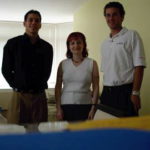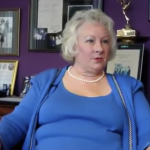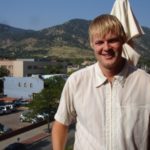On our first day of the trip, with the RV puttering along the I-8 freeway between Phoenix and San Diego, Daniel made the desperation call to Aunt Patti at 8pm our time, 10pm Chicago time. Our original plan was to stay in the RV that had broken down twice and guzzled $300 in gas already. But since we needed to get some rest and get out of the vehicle we’d been housed in for twelve hours (and would be staying in for the next month), Daniel decided he’d ask if we could stay at Aunt Patti and Uncle Jerry’s beach house in San Diego.
Understanding our situation, they gave Daniel the ok from two thousand miles away to stay there for the next two nights, and we were saved from sleeping in the trenches of “Maggie Miracles.” Upon arrival, we were exposed to a piece of real estate that was representative of Uncle Jerry’s successful entrepreneurial career, and before we even walked through the door, I knew that we had to have a PTP interview with the Uncle that I had heard so much about.
We met up with Uncle Jerry three months and sixty-eight interviews later in his Rockford, Illinois home, which closely resembled what “the American Dream” might look like. A long driveway leading to a secluded home, complemented by green grass, tall trees and a gleaming blue Aston Martin as the garage’s new centerpiece. It was evident that after staying and visiting Uncle Jerry’s three residences, that the real estate business had treated him well over the years. But we were there to find out a little bit more about the man who stays out of the press and has chartered flights for the President. The journey begins like this…
At 21 years old, Jerry’s goal was to become a lawyer. He completed his undergraduate degree with a major in business, and began pursuing his educational goal of completing law school to become a tax lawyer. After graduation Jerry went to work for Arthur Anderson, who at the time was hiring about fifty lawyers to work in their tax department. Wanting to become a tax lawyer, Anderson’s training program offered a good foundation and valuable experience, which Jerry obtained over the 3 years he spent with the firm. Before long, family matters took precedence, and Jerry returned to his hometown of Rockford, IL where he joined a law firm for 2 years.
Always wanting to go into business for himself, Jerry left the Rockford firm to start his own. This decision resulted in lots of success, but he knew it wasn’t where he wanted to go for the long term.
In his time as a lawyer Jerry did some work for various real estate developers and came to realize that what they were doing was not all that complicated. Searching for a profession that didn’t determine the money you made by the hours you worked, he decided to make a subtle shift from law to real estate. While still holding his duties as a lawyer, Jerry and a friend started to do a few deals with small office buildings. And so his career in real estate began.
He eventually left law altogether, and started to focus on his real estate development business. He started by developing small office buildings for insurance companies, then moved to retail development. Small strip centers developed into bigger grocery store anchor centers and ultimately cascaded into “big box” developments with stores like Target and Home Depot.
The path was not always easy for Jerry, and the story that was discussed in our interview outlined Jerry’s strong optimism and his willingness to take risks for something he believed would work. One of his first big deals was him and his partners wanted to go to market with a big strip center. Some of his partners wanted to jump at an exit strategy that included a handsome six figure profit. They perceived the debt level to be high and felt that they would be “on the hook” by proceeding with the plan.
But Jerry had a strong feeling about the opportunity. He went to his banker, Jack Joyce, the man who made loans to Jerry on the basis of character “when no one else would.” Jerry’s plan was to buy out the partners whom opted for the exit strategy, so that he wouldn’t have to sell his part of the investment. Consequently, Jerry put up his house, putting himself and his family at risk, to come up with enough capital to buy out the remaining partners.
Two and a half years after he and two other partners put up their houses, Jerry’s team turned a profit that would have netted them in the six-figure range into a sum with a couple more zeros. By trusting his gut instinct and taking an educated risk, Jerry was able to reap more profitable rewards.
Here is the advice that Jerry had to offer young adults on risk taking:
“Young people think they have so much to lose. They really don’t have that much to lose. You look at the people just starting out in the world that are taking risks, and they can do that because they are young and you can start over if it doesn’t work. It’s the old people that have a lot of money that are fearful of losing something. But at your age, I can’t see why you would be afraid of taking a risk. But it’s about calculating your risks, and acting upon them.”
Author’s Note:
A couple of interesting points that I did not manage to discuss in this write-up that I wanted to include compliment “the character” banker Jack Joyce saw in Jerry when he loaned him money in a time of need. These actions that both Jerry and his wife Patti have taken over the past ten years exemplify their passion to help others in the community and across the globe.
When I first came to know Jerry’s son Hank at the University of Arizona, I asked him how many brothers and sisters he had. He said six, not a common number for a family. So we got to talking and that’s when I first learned that Hank had a sister from China, a brother from Hong Kong, one sister from Germany and another from Albania , as well as his biological brother and sister from Rockford.
What Jerry’s wife Patti has done with the blessing of a successful real estate career is adopted three children to help better their lives. The Weber’s love, support, and upbringing in their family has allowed Gavin, now 24 and living in the Chicago area, to pursue a career in architecture, and daughters Selma and Emma to have the opportunities that they would not have otherwise.






